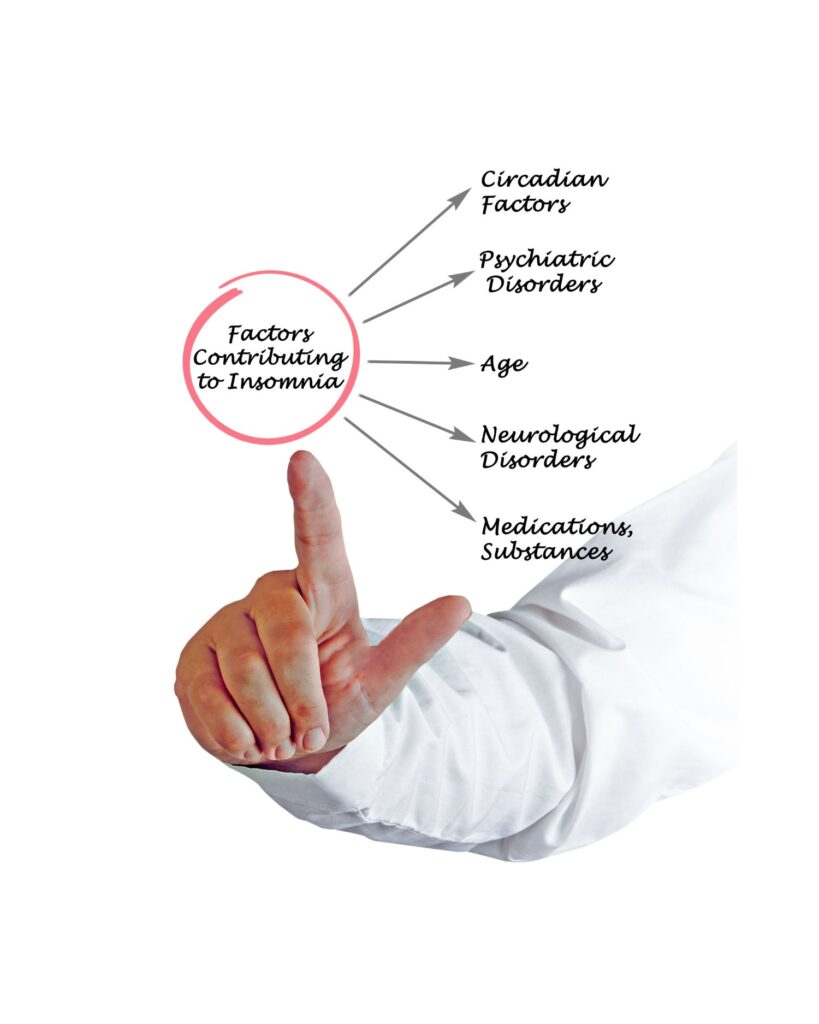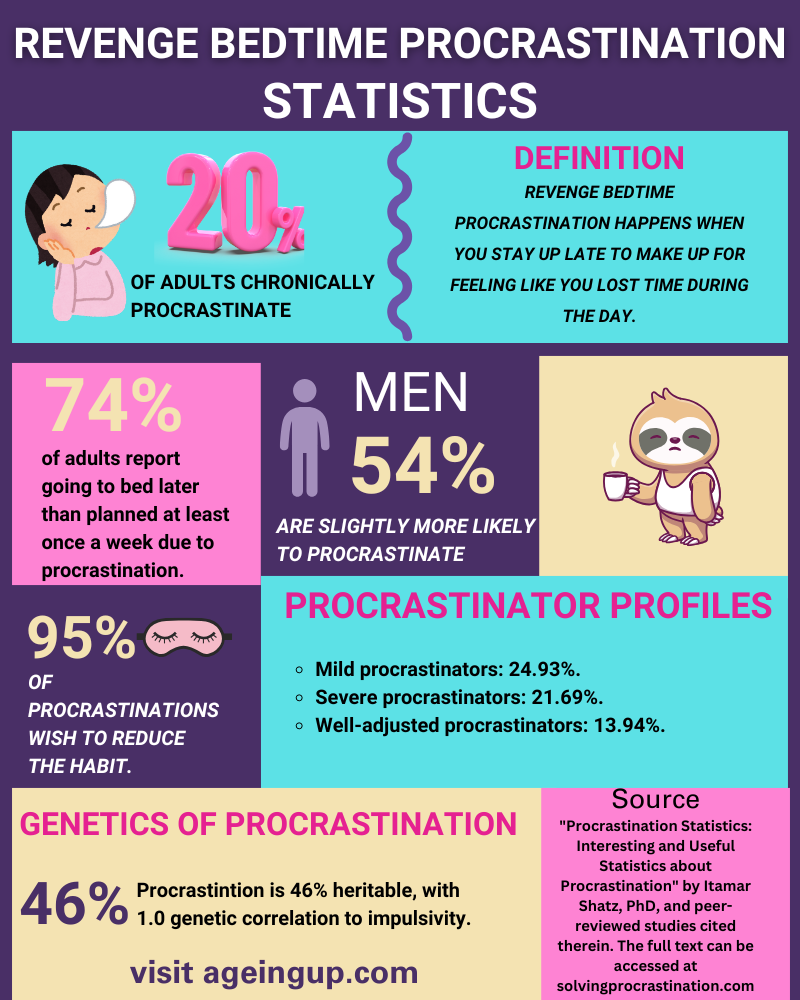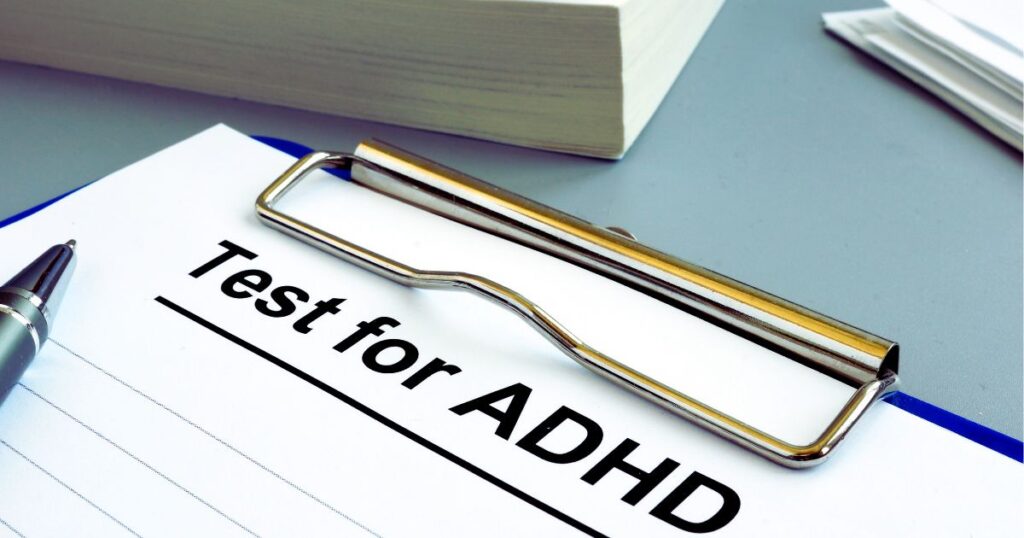As an Amazon affiliate, I may earn from qualifying purchases. Please read our Disclaimer and Privacy Policy.
Revenge bedtime procrastination is a somewhat aggressive way of saying “avoiding sleep”. Why would anyone want to avoid sleep? Well, let me explain. It will make more sense in a minute.
The concept refers to the habit of delaying sleep.
It’s a way for some people to reclaim personal time lost during the day. It’s a common struggle for many people, especially those with Attention Deficit Hyperactivity Disorder (ADHD).
It’s easy to get caught in a cycle of revenge bedtime procrastination, especially if you feel the whole day got away from you without productivity.
Keep reading to learn more. In this post, I cover five ways ADHD contributes to this cycle. I’ve also added strategies to help conquer revenge bedtime procrastination for people with ADHD.

1. Time Blindness and Losing Track of Time
I’ve written about time blindness in other blogs posts related to ADHD.
I suspect a lot of people (myself included) find it hard to gauge how long it’s going to take to finish a task. Of course, if you had ADHD to the mix, it’s going to be that much harder to determine a reasonable time frame.
For example, let’s say you want to dry and fold your laundry before a dental appointment and you give yourself 30 minutes to do it.
In reality, it’s probably going to take that long for the clothes to actually dry. It’s easy to forget the clothes are even in the dryer, especially if you have ADHD.
Of course, you’re probably not totally fixated on the laundry.
You might find yourself sending a few texts, starting another household project like putting dishes into the dishwasher, etc. The next thing you know you’ve got five minutes to get to your appointment and the clothes are still in the dryer.
You’ll have to finish the clothes when you get home. Also, did I mention that only some of the dishes managed to get into the dishwasher?
Now you’ve got to add that to your list of things to do later. And on and on it goes.
Sound familiar? That’s time blindness.
As the end of the day approaches, it’s easy to get caught up in late-night activities like scrolling through social media, playing video games, or binge-watching TV.
These activities are often dopamine-seeking behaviors, providing short-term satisfaction at the expense of much-needed sleep.

Impact on the Cycle of Revenge Bedtime Procrastination (ADHD)
I’m sure this happens to everybody once in a while. There are days when time just seems to slip away. I’ve had plenty of days when I felt like I just couldn’t accomplish anything.
Unfortunately, it can really impact quality sleep in the following ways:
- Time blindness causes individuals to lose track of time, making bedtime seem less urgent.
- Electronic devices and bright screens further disrupt circadian rhythm, delaying the natural release of melatonin.
- The result is a delayed sleep phase syndrome, leaving ADHD brains stuck in a cycle of poor sleep hygiene.
Solution to Revenge Bedtime Procrastination (ADHD)
I’ve listed a few suggested solutions below. It’s really important to try and find ways to allow your body time to relax and unwind in the evening. I’ll admit, it can feel really good to stay up later to reclaim time. All you’re really doing in the long-term, however, is keeping the cycle going.
Why? Because fatigue makes it even harder to concentrate the next day. You might even feel more irritated, more scattered, drink more caffeine to keep yourself going, etc. And the cycle continues.
Here are a few ideas to help break the cycle of revenge bedtime procrastination:
- Use tools like an Oura Ring or sleep-tracking apps to monitor hours of sleep.
- Set alarms to signal the start of a bedtime routine.
- Create a clear “bright line” between day-to-day life and bedtime activities, such as turning off electronic devices an hour before sleep.
- Introduce a soft start to trigger your body into winding down in the evening. What you do will look different for everybody. I prefer to take a bubble bath in the evening. For you, it could be something else.
According to statistics reported by SolvingProcrastination.com, approximately 74% of adults report going to bed later than planned at least once a week, without any external reason.

2. Racing ADHD Brain and Emotional Regulation Issues
Of course, if you have ADHD it might be more difficult to wind down in the evening. ADHD minds often struggle with racing thoughts, worry, and frustration.
Do you also get negative thoughts taking up space in your mind? It’s easy to say “don’t listen to them” but almost impossible to do.
I get it. It’s hard to jump into any kind of relaxation when your mind is racing. Unfortunately, the delayed sleep patterns just make the whole thing worse.
The good news is that it’s not impossible to reverse the cycle.
Yes, it will take a little work, but it can be done if you make it a priority. Think about it this way, the better you get at allowing yourself time to unwind, the easier it will be to complete the tasks you want to complete the next day.
Give yourself time and don’t beat yourself up if this doesn’t happen overnight. It’s really hard to break bad habits. We all slip up. Just try to keep working on some of these five steps to avoid revenge sleep deprivation.
Impact on the Cycle of Revenge Bedtime Procrastination (ADHD)
Here are some things that tend to happen when you don’t allow yourself time to unwind at the end of the day (regardless of how much or how little you think you accomplished.)
- The ADHD brain feels compelled to keep going, making late-night activities seem like the only time to decompress.
- Emotional dysregulation amplifies stress from unfinished to-do lists, further delaying sleep.
- Chronic sleep deprivation results, creating a negative feedback loop where lack of sleep worsens emotional regulation the next day.
Solution
- Practice progressive muscle relaxation or meditation to calm the racing brain.
- Incorporate a nightly “brain dump”—write down thoughts and tasks to relieve mental clutter.
- Work with an ADHD coach or listen to resources like the ADHD Experts Podcast for actionable sleep strategies.
Grab This Free Printable Daily Accomplishments Checklist!
I love checklists because then I can actually see what I’ve accomplished in a day. Just being able to tick off one or two boxes makes all the difference in how I feel.
In fact, you’ll be surprised at how much you really did accomplish on any given day. This acknowledgement (in the form of a helpful checklist) makes it much easier to relax at the end of the day.
Subscribe to my newsletter for exclusive content, more freebies (like a free printable ADHD planner! ) and get instant access to the checklist.
3. Dopamine-Seeking Behavior and Impulse Control
ADHD symptoms often include seeking immediate rewards, which leads to engaging in activities that provide instant gratification at the expense of a good night’s sleep.
Dopamine is a chemical in your brain that acts as a neurotransmitter. This “messenger” helps brain cells (neurons) communicate with each other.
It helps regulate your sleep-cycle or circadian rhythm. During the day, it should be naturally high to keep you awake and alert. As nightfall comes, your levels of dopamine should fall, making you sleepy.
Unfortunately, when we fill our eyes and brains with the stimulation of scrolling through social media (or the equivalent) that dopamine level is artifically kept at a higher level.
That’s one reason why it’s harder to get to sleep.
Impulse control challenges make it hard to resist “one more episode” or “just five more minutes” of social media. Of course, we all know that “five more minutes” usually winds up being an hour. Our brains love those dopamine hits!
Impact on the Cycle
Unfortunately, the more dopamine hits we get, the more amped up with become. The impact on your sleep cycle includes the following:
- Late-night activities become hard to stop, as they fulfill the ADHD brain’s need for stimulation and dopamine.
- Impulse control issues make establishing a regular bedtime feel nearly impossible.
- Over time, bad habits form, leading to chronic sleep deprivation and a worsening revenge bedtime procrastination ADHD cycle.
Solution For This Type of Revenge Bedtime Procrastination
- Set limits on screen time using app blockers or timers.
- Create a bedtime routine that includes rewarding activities, like reading a new book or listening to calming music, to satisfy the dopamine-seeking behavior without disrupting sleep.
- Seek support help from fellow ADHD brains through online forums or groups focused on ADHD education.
- Stick physical reminders (like actual sticky notes) on your phone or your TV with reminders on why it’s important to rest. For example, you might write something like, “If I don’t shut this off I’ll never sleep and probably won’t get much done tomorrow.”

4. Poor Sleep Hygiene and Irregular Sleep Schedules
Maintaining a regular sleep schedule can feel impossible for people with ADHD. This can be especially hard if you’re a shift worker! Irregular work schedules, late-night activities, and a lack of structured routines contribute to poor sleep hygiene.
We all have to work, so there’s not much you can do if you’re working night shifts. However, there are still ways that you can create your own unique routine that makes it easier to get the sleep you need.
Impact on the Cycle of Revenge Bedtime Procrastination (ADHD)
Honestly, I sympathize if you’re working night shifts. I know people who seem to roll with the irregular sleep schedule with ease. But they don’t have ADHD either.
Some of the negative impacts can include the following:
- Sleep quality suffers due to inconsistent timing of ADHD medication or improper relaxation techniques.
- Irregular sleep schedules perpetuate the cycle of revenge sleep procrastination, making it harder to recover.
- Sleep problems exacerbate ADHD symptoms, such as difficulty with time management and executive functions, creating a vicious cycle.
Solution
- Develop a better sleep routine with consistent bedtimes and wake times, even on weekends.
- Use tools like an eye mask or white noise machine to create an optimal sleep environment.
- Partner with an ADHD coach to establish a regular bedtime and track progress.
- I use a pair of noise-cancelling Airpods Pro to listen to meditations from my Headspace app. Works like a charm.

5. Lack of Free Time and Stress Management
For many adults with ADHD, the end of the day feels like the only time available to decompress.
This perceived lack of free time during the day—caused by busy work schedules, long hours, and managing home life—leads to a need for personal time late at night.
If you’re an older adult like me, and retired from the day-to-day job, the impact of grabbing personal time in the evening may not be as disruptive.
However, if you have responsibilities (children, jobs, pets, etc.) that don’t allow you to sleep in, it’s even more important to try and get the rest you need.
Impact on the Cycle of Revenge Bedtime Procrastination (ADHD)
Here are a few ways the impact of this cycle can affect you:
- Late-night activities feel like the only way to regain control over the day, reinforcing revenge bedtime procrastination habits.
- Lack of sleep worsens ADHD struggles, like emotional regulation and attention, making the next day even harder.
- Over time, the cycle of delayed sleep takes a toll on physical health and mental health.
Solution
- Schedule intentional relaxation time earlier in the day to avoid relying on late nights for personal time.
- Practice stress management techniques, such as yoga or journaling, to reduce the need for revenge bedtime procrastination.
- Listen to ADHD education resources like Tracy Otsuka’s ADHD Report to learn practical strategies for managing stress and sleep.
Breaking the Cycle of Revenge Bedtime Procrastination
The ADHD experience makes managing sleep a common struggle, but with the right strategies, it’s possible to break free from the revenge bedtime procrastination cycle.
By addressing time blindness, emotional regulation, impulse control, and poor sleep hygiene, you can improve your sleep patterns and overall mental health.
Remember, small changes—like creating a bedtime routine, practicing good sleep hygiene, and seeking support help—can make a big difference in achieving enough sleep and breaking this cycle for good.
Start by implementing one or two changes tonight and see how it impacts your sleep time. Your fellow ADHD brains are rooting for you to get a good night’s sleep!
Have you found a solution that works for you? Let me know in the comments.
Share This Infographic: Revenge Bedtime Procrastination (ADHD)
Feel free to use this infographic on your website by copying the embed code below.


